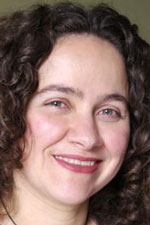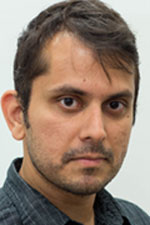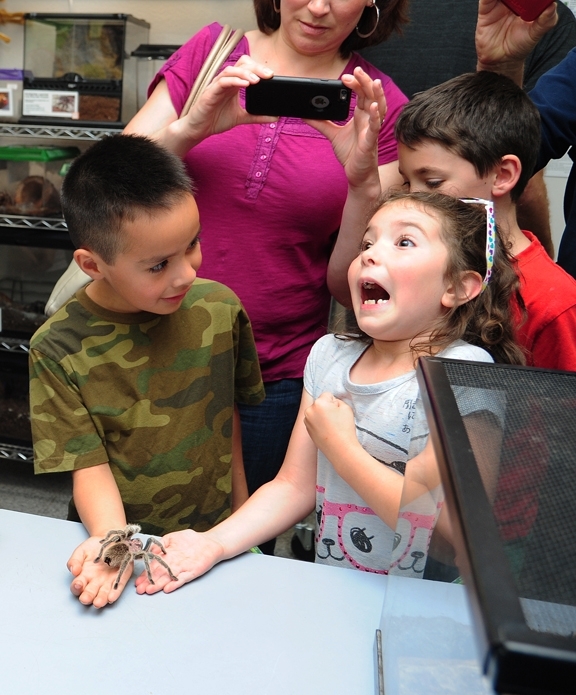Professor Mariel Vazquez has been named the recipient of the 2016 Blackwell-Tapia Prize, honoring her record of achievement in mathematics and her efforts to increase diversity in the mathematical sciences at all levels, from speaking with elementary school students to mentoring graduate students.
In This Column
- Mathematician Mariel Vazquez wins Blackwell-Tapia Prize
- Department chair Amit Kanvinde wins civil engineering research prize
- Educational research association honors Jamal Abedi and Christian Faltis
- Good fellows: Alexander Aue, Joe DiTomaso, Peter Moyle
- Cool Davis names Stephen Wheeler an Eco-Hero
- 5 win Association for Communications Excellence awards

Other Awards
Vazquez, who has appointments in the Department of Mathematics, and the Department of Microbiology and Molecular Genetics, specializes in the emerging field of DNA topology, using math to attack biological puzzles.
The Blackwell-Tapia Prize is given every other year to a mathematician who has contributed significantly to research in his or her field of expertise, and who has served as a role model for scientists and students from underrepresented minority groups or has contributed in other significant ways to addressing the problem of underrepresentation of minorities in math.
The award and its related conference honor David Blackwell, the first African American member of the National Academy of Science, and Richard Tapia, winner of the National Medal of Science in 2010, two seminal figures who inspired a generation of African American, Native American and Latino/a students to pursue careers in mathematics.
The 2016 conference is scheduled in October at the University of Tennessee.
•••

Amit Kanvinde, professor and chair, Department of Civil and Environmental Engineering, has been named the recipient of the 2016 Walter L. Huber Civil Engineering Research Prize from the American Society of Civil Engineers. The award is named after a former president of the society.
Kanvinde’s research interests focus on the seismic response of steel structures, with an emphasis on fracture and fatigue. His research combines large and small-scale experiments with model-based simulation to develop a more fundamental understanding of the response of structural systems. He is an associate editor of the Journal of Structural Engineering, published by the American Society of Civil Engineers.
Founded in 1852, the society is the nation’s oldest engineering society. It has more than 150,000 members in 177 countries.
•••
Two professors in the School of Education returned with news to share from this month's annual meeting of the American Educational Research Association.
- Jamal Abedi received the 2016 E.F. Lindquist Award, recognizing outstanding research in the field of testing and measurement. The award’s namesake was a pioneering scholar and researcher who co-founded The American College Testing Program, or ACT. Specializing in educational and psychological assessments, Abedi’s research focuses on testing for English-language learners and issues concerning the technical characteristics and interpretations of these assessments.
- The association installed Christian Faltis as a new fellow. He holds the Dolly and David Fiddyment Chair in Teacher Education and serves as co-director of Teacher Education. He has written numerous books and articles focusing on how novice teachers can improve their teaching by learning about language practices and becoming advocates for bilingual students and their families.
•••
Three more fellows:
- Alexander Aue, associate professor of statistics — American Statistical Association. Fellows of the world’s largest community of statisticians are nominated by their peers for outstanding contributions and leadership in the statistical sciences. Aue’s research focuses on analysis of time series data (information collected over time) to develop predictive models and extract meaningful information, with applications ranging from astrophysics to the stock market.
- Joe DiTomaso, Cooperative Extension weed specialist, Department of Plant Sciences — Western Society of Weed Science. The awards committee acknowledged DiTomaso’s incredibly active career as a scientist, and his leadership in weed science at the state, regional and national levels. He has published more than 140 journal articles, 37 book chapters, two books, and hundreds of other scientific and extension publications, all while routinely delivering about 50 in-person extension presentations each year and mentoring weed science colleagues in California and around the country.
- Peter Moyle, distinguished professor emeritus, Department of Wildlife, Fish and Conservation Biology — Ecological Society of America. With his vast knowledge of California fish and aquatic ecosystems, Moyle has been drawn into the public arena of water management in the state. He has championed the use of existing (but unenforced) laws to ensure adequate release of water from reservoirs for fish, most prominently in litigation involving Putah Creek and the San Joaquin River. Moyle also was responsible for quantifying the decline of delta smelt, a key indicator species of Sacramento-San Joaquin Delta ecosystem health.
•••
Cool Davis recently honored its three Eco-Heroes for 2016 — and one of them is a UC Davis professor, Stephen Wheeler, landscape architecture and environmental design. The Eco-Hero award recognizes Davis residents who incorporate sustainable practices into their work, civic and everyday lives.
Indeed, Wheeler practices what he teaches: sustainable development, land use planning and urban design. Recently, he has been working with others in the community to try to ensure that large new development projects are sustainable and promote infill.
•••
The Davis campus’s Diane Nelson and Kathy Keatley Garvey are being honored for their work in telling the UC Davis story. The honors are from ACE, the international Association for Communications Excellence in Agriculture, Natural Resources, and Life and Human Sciences.
ACE’s annual Critique and Awards Program also recognized Steve Elliott, Cheryl Wilen and Scott Parker, all affiliated with the Davis-based Statewide Integrated Pest Management Program, run by UC’s Agriculture and Natural Resources.
Nelson, a senior writer for the College of Agricultural and Environmental Sciences, won a gold (first place) in writing for her news release, “Farmland May Provide Key to Replenishing Groundwater.”

Garvey, senior writer for the Department of Entomology and Nematology, won a gold for a photo of two children interacting with a tarantula at the Bohart Museum of Entomology; silver for her feature story on Jeff Smith, volunteer curator of the Bohart museum’s 400,000-specimen butterfly and moth collection; silver for her photo series, “Miracle of Life,” depicting a monarch butterfly egg, caterpillar, chrysalis and adult (published on her Bug Squad blog); and bronze for a feature photo of two praying mantids as they are mating (also published on Bug Squad).
Elliott, communications coordinator for the Western Integrated Pest Management Center (housed within ANR’s Statewide IPM Program), won a silver award in the newsletter category for The Western Front, a monthly, digital publication.
The other award winners, Wilen and Parker, work with Cooperative Extension in Southern California, the former as an area IPM advisor and the latter as an IPM community educator. They won a bronze in the diversity category for their development of bilingual “identifier wheels”: one to help people identify and manage 12 common pests, including ants, snails, powdery mildew and scale insects; and the other covering 12 common garden and landscape weeds, including crabgrass and yellow nutsedge. Each wheel has an English side and a Spanish side.
•••
Dateline UC Davis welcomes news of faculty and staff awards, for publication in Laurels. Send information to dateline@ucdavis.edu.
Media Resources
Dateline Staff, 530-752-6556, dateline@ucdavis.edu